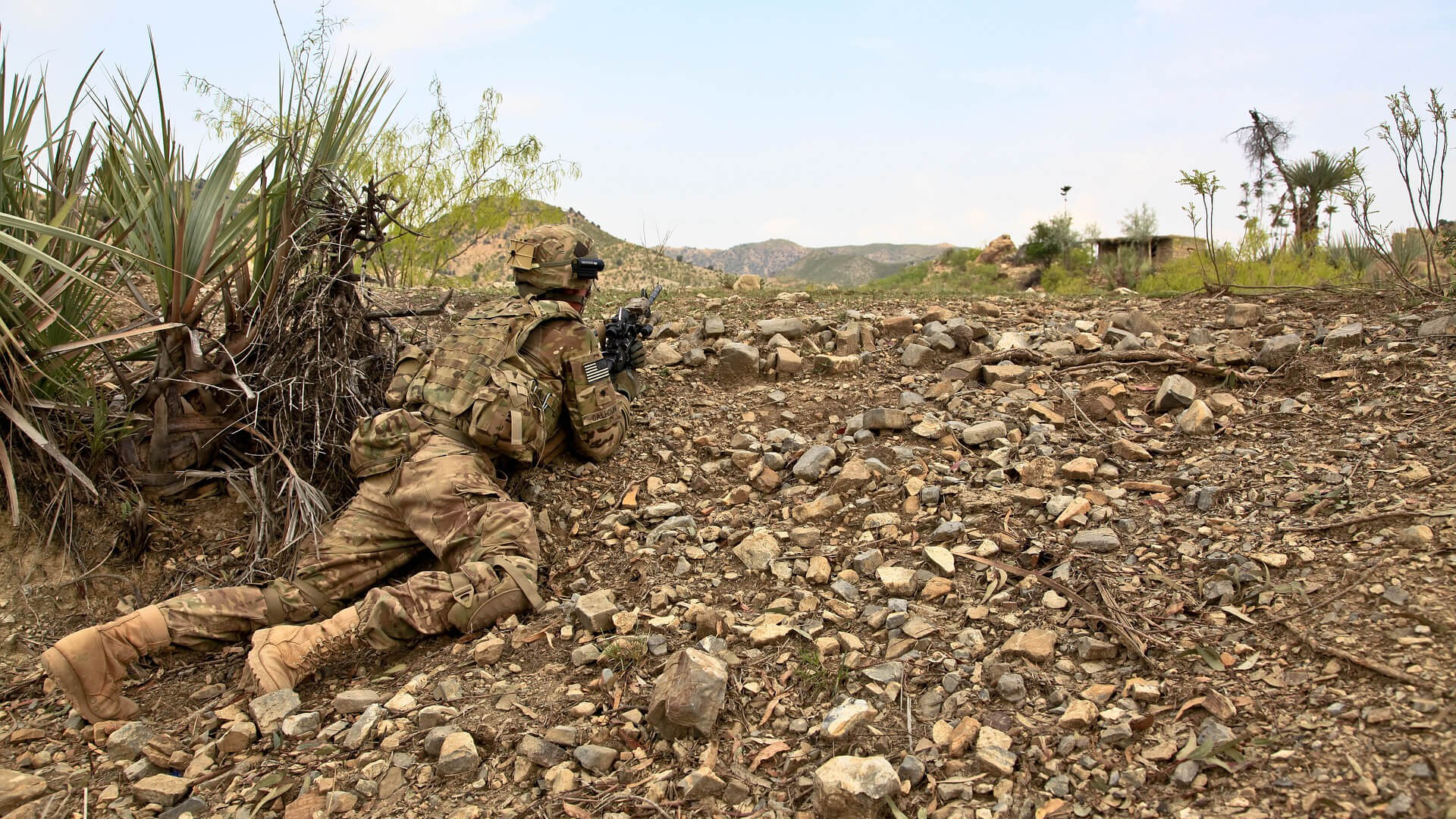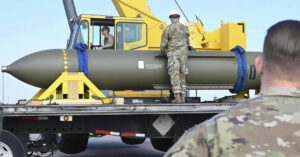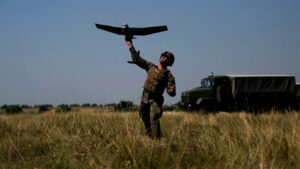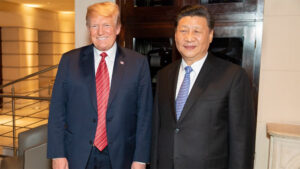More than a few countries out there couldn’t walk and chew gum at the same time…but the US isn’t one of them. Today’s question in the ‘Ask Peter Series’ looks at whether or not the US has stretched itself too thin in Ukraine to deal with another major conflict.
Yes, the US has given the Ukrainians a couple of shiny new toys, but most of the stuff has been obsolete hand-me-downs. And how often do you get to test your new weapon systems in a real-world setting? So the only thing in the mix that throws up any red flags for me is the cluster munitions (and those were going to be retired soon anyways).
This war hasn’t impacted US military preparedness, and if China wanted to try its luck, they’d get an ass-whoopin’ compliments of Uncle Sam. The big piece here is that the people doing the walking and chewing the gum are entirely different. If anything, our involvement in Ukraine has been a proof of concept for how the US will fight the wars of the future.
Prefer to read the transcript of the video? Click here
Here at Zeihan On Geopolitics we select a single charity to sponsor. We have two criteria:
First, we look across the world and use our skill sets to identify where the needs are most acute. Second, we look for an institution with preexisting networks for both materials gathering and aid distribution. That way we know every cent of our donation is not simply going directly to where help is needed most, but our donations serve as a force multiplier for a system already in existence. Then we give what we can.
Today, our chosen charity is a group called Medshare, which provides emergency medical services to communities in need, with a very heavy emphasis on locations facing acute crises. Medshare operates right in the thick of it. Until future notice, every cent we earn from every book we sell in every format through every retailer is going to Medshare’s Ukraine fund.
And then there’s you.
Our newsletters and videologues are not only free, they will always be free. We also will never share your contact information with anyone. All we ask is that if you find one of our releases in any way useful, that you make a donation to Medshare. Over one third of Ukraine’s pre-war population has either been forced from their homes, kidnapped and shipped to Russia, or is trying to survive in occupied lands. This is our way to help who we can. Please, join us.
CLICK HERE TO SUPPORT MEDSHARE’S UKRAINE FUND
CLICK HERE TO SUPPORT MEDSHARE’S EFFORTS GLOBALLY
TRANSCIPT
Hey everyone. Peter Zeihan here coming to you from an incredibly green Colorado. We’ve gotten double our annual precipitation before we even hit April, but hasn’t stopped yet. Today, as part of the ask period to your series, we’re going to talk about chewing gum and walking at the same time. The concern is that in supplying weapons to the Ukrainians, the United States might be stretching its bandwidth to be able to deal with a major conflict like, say, with China.
The punch line is, no, this is not something I’m worried about at all. For the simple reason that the people would be doing the gum chewing and the walking or different people, any sort of military conflict that the Americans are going to get involved with, with the Russians are going to be primarily on land first and foremost in Ukraine itself.
That’s an army job. And any conflict that soon involved the Chinese is going to be on the high seas. That’s the Navy’s and to a lesser degree, Marines job. So the United States is perfectly capable of fighting two wars if they’re very different sorts of wars. So I’m not worried there. Number one. Number two, nothing has happened with the Ukraine war yet that has really hit American military preparedness.
So let’s get this first. From the weapons point of view, it’s already been given most of the weapons system, almost all the weapons systems that the United States has provided to the Ukrainians are things that the United States you know, most of the stuff that the American right it to the Ukrainians are things that the U.S. military hasn’t used itself since at least the 1990s and in most cases further back.
This is Army surplus that has to technologically be high the military uses. And so really, the Ukrainians are just going through our hand-me-downs now. We would have given these things to the allies. That’s what we did at the end of the Cold War, for example. But most of the military’s in Europe have been downsizing or skipping a generation.
What we’ll do is left all this stuff like Hummers going around and warehouses. So with a couple of notable exceptions, these are not things that the U.S. uses at all, the notable exceptions. There are currently two Patriot batteries operate in Ukraine that is very close to the top of an aircraft that the United States has right now. I would argue that even though taking those out of American service might be at the strategic issue for the U.S. a little bit.
It’s worth it because we’re getting real time experience with U.S. technology and third party hands against top of the line Russian equipment, most notably the Kinzel cruise missiles. And we now know for certain that even without American personnel operating them, the Patriots don’t done that. The Russians have that was a great bit of information that we didn’t have before.
The other thing is, are three shells. Now, the United States has not been engaged in a massive war to Vietnam. Even when you look at the Gulf Wars, they were very short little events. And so we haven’t had to use artillery in volume for a very long period of time in the United States, which means that our production of artillery shells has been pared to the bone and we are going through we the Ukraine is going through more artillery shells in a month and the United States can produce in a year.
And Europe is even further behind when it comes to munitions. So that has prompted the United States to get Canadians weapons systems that we are in the process of phasing out. And most notably, that is the cluster munitions that you may have seen in the news recently. Now, a cluster munition is one single piece of explosive. There are dozens or hundreds of little but spread over an area.
The Ukrainians have been on the receiving end of these weapons since the beginning of the war. Russians have preferred to use the cluster munitions whenever they’re targeting a city. They’ll use them when they go in and get things like tanks and so there’s already hundreds of thousands, if not tens of millions of these little bomblets, some of which haven’t exploded, scattered across all of eastern and southern Ukraine, aren’t brought up.
The kids aren’t thrilled. But from the Ukraine interview, gimme, gimme, gimme, gimme, gimme. Because anywhere they can get and I believe they’re going to use cluster munitions on their population centers. That’s the job for the Russians anyway. These are weapons that are for is it’s a little distasteful. And the United States Army was in the process of them out anyway.
So again, this kind of falls into the category of surplus stuff, even if it’s not quite kind of there anyway. Bottom line, U.S. military preparedness really hasn’t been affected by this war to this point. If anything, it’s proving to be a useful proof of concept for how the U.S. is likely to fight wars in the future. In the aftermath of the war on terror in Iraq and Afghanistan.
There is no political support in the United States for a mass deployment for anything except for top level national defense. That’s not seen as an issue right now. No one’s dumb enough to attack the United States directly. At least I don’t think that’s going to happen. Which means that U.S. strategic policy is going to be operating through third parties and or using special forces.
And so with Ukraine, where we have a motivated third party who was very willing to be an ally except in equipment, and we’re finding out how well that works and getting some expertize and figuring out what to do better the next time around. So all in all, in a weird sort of way, you can kind of thank the Russians for getting the United States to where it needs to go, both getting rid of its what and learning how to fight for the next century.
Alright. That’s it. Bye..








